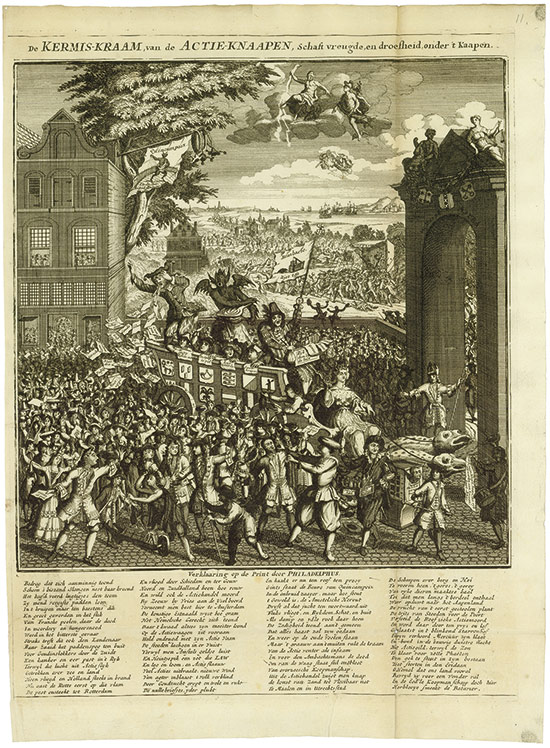Ingelsberg 17 b
D- 85604 Zorneding
Deutschland / Germany
Tel.: +49 (0)8106 - 2461-86
Fax: +49 (0)8106 - 2461-88
E-Mail: auktion@hwph.de
HWPH Historisches Wertpapierhaus AG –
Váš specialista na historické cenné papíry
a historii finančnictví
|
||||
Číslo |
1320 | |||
Titul |
John Law: De Kermis-Kraam, van de Actie-Knaapen, schaft vreugde, en droefheid onder't Kaapen | |||
Místo(a) |
||||
Země |
Frankreich | |||
Region |
Europa | |||
Popis |
Aktien-Flugblatt, Kupferstich um 1720, 47,6 x 35 cm, Knickfalten, Text in Holländisch. | |||
Stav |
VF | |||
 |
||||
Historie (Německo) |
Als der Sonnenkönig Ludwig XIV. 1715 starb, waren in Frankreich allein die jährlichen Zinsen für die Staatsschuld schon größer als die laufenden Einnahmen des Staates. In dieser Zeit hatte John Law einigen europäischen Höfen phantastisch klingende Finanzierungsprojekte unterbreitet, fand jedoch erst in Frankreich Gehör. Der Schotte bekam bald die Erlaubnis, eine private Kreditbank zu errichten, die kurz darauf in eine Staatsbank umgewandelt wurde. Diese gab „Zettel“ aus. Nach Laws Theorie sollten die „Zettel“ durch Grund und Boden gedeckt sein und daher auch das Metallgeld ersetzen können. 1718 wurden Laws „Zettel“ als Staats-Papiergeld anerkannt. Handel und Gewerbe blühten in der Folgezeit auf und die Zinsen sanken. Inzwischen hatte John Law eine weitere Gründung vollzogen, die „Mississippi-Compagnie“. Diese hatte die Kolonialisierung der Region am Mississippi zum Ziel. Bis Mai 1720 wurden 500 Schiffe gebaut oder gekauft. Es herrschte Aufbruchsstimmung und Euphorie. In diesem Überschaum bediente sich der Staat der Notenpresse. Als Konsequenz folgten steigende Preise - nicht nur für Waren, sondern auch für Aktien. Die Papiere von Laws Mississippi-Gesellschaft schossen in wenigen Jahren von 500 auf 18.000 Livres in die Höhe. Schon bald konnten die Banken die Noten jedoch nicht mehr einlösen. Law suchte den Ausweg, indem der Nominalwert halbiert wurde. Die Konsequenz war jedoch, dass ganz Frankreich in Aufruhr geriet und Law fliehen musste. | |||
Historie (Angličtina) |
The French budget was in a catastrophic condition when Louis XIV died in 1715. The Government paid every year more interests for their debt than it had current receipts. John Law developed at this time fantastic sounding financial projects. Most European Governments rejected the plans of John Law. In France however Law was heard. Law got the concession to form a private bank, which was changed to a national bank later. Law’s bank issued banknotes. According to Law's theory the banknotes were secured by Land. The banknotes should be a surrogate for the metal coins. Law's banknotes were accepted as Government paper money in 1718. A boom in trade and industry and a period of declining interest rates followed the introduction of Law's paper money. John Law made another foundation in the meantime. He founded the “Mississippi-Compagnie”. The goal of this company was the colonization of the area at the Mississippi. 500 vessels were built or bought until 1720. Euphoria and spirit of optimism dominated France. The Government started the printing press during this Euphoria. Prices for goods as well for shares rose as a consequence. In a few years, the shares of the Mississippi-Company shot up from 500 to 18,000 Livres. But very soon, the banks could no longer honour the bills. Law looked for a way out when the face value was cut in half. However, the consequence was that all of France revolted and Law had to flee. | |||
Povšimněte si prosím také nejlepších položek naší aukce: |
||||













